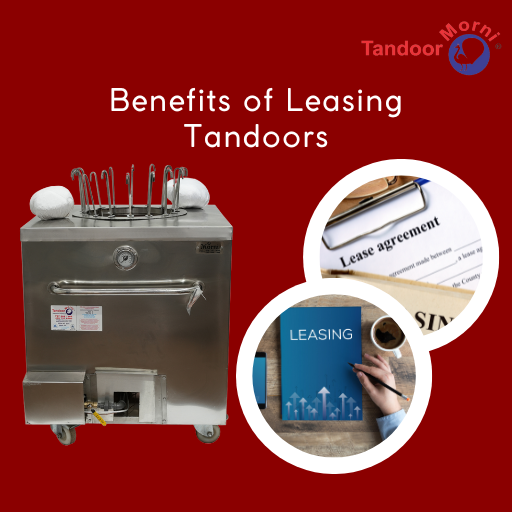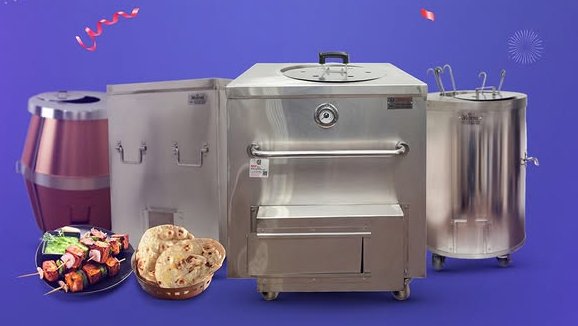
Leasing Restaurant Equipment: Exploring the Advantages and Disadvantages
Expanding a restaurant, starting a new one, or simply upgrading equipment often involves a significant financial commitment. One key question that arises is whether to buy or lease restaurant equipment. This decision can apply to a variety of items, from leasing Tandoor Ovens and Clay Ovens to grills, refrigerators, and dishwashers. Leasing offers a flexible way to acquire the equipment without the burden of a large upfront cost, while buying gives you immediate ownership. To help you make the best choice for your business, let’s explore the pros and cons of leasing in detail.
Leasing restaurant equipment allows you to spread payments over time, making it easier to manage cash flow and maintain a flexible budget. It’s not just about leasing tandoor ovens; you can lease almost any equipment your kitchen needs. From cooking tools to storage, cleaning, and even point-of-sale systems, leasing is a popular option that can help both new and established restaurant owners optimize their expenses.
Understanding Leasing: What Does It Mean for Your Restaurant?
Leasing is like renting, but with the option to own the equipment at the end of the lease term. You agree to make monthly payments over a set period, usually ranging from 24 to 60 months. When the lease ends, you may have the option to buy the equipment for a small fee. This arrangement allows you to get essential equipment, like a tandoor oven, immediately and use it to generate income while making manageable payments.
Leasing can be appealing because it eliminates the need for a large one-time purchase. For restaurants, this means you can spread costs out while keeping more cash on hand to invest in other areas of the business. However, leasing isn’t always the best option for everyone. Let’s dive into the pros and cons to see if it’s right for you.
The Benefits of Leasing Restaurant Equipment
1. No Major Upfront Payment
One of the biggest advantages of leasing is the minimal upfront cost. Most leases do not require a down payment, or if they do, it’s much smaller compared to buying outright. This is ideal for businesses that are just starting or expanding and don’t have the capital for large purchases.
When you choose leasing tandoor ovens or other essential kitchen equipment, you can start using the items right away without dipping deep into your cash reserves. This allows you to open your restaurant or expand services without delay, which is crucial for maintaining momentum and growth.
2. Improved Cash Flow Management
Cash flow is the lifeblood of any business, and leasing can help you keep it healthy. By spreading out payments, you avoid putting a significant dent in your finances. The money saved can be used for other expenses, like marketing, salaries, or unexpected repairs.
Leasing can be particularly beneficial for seasonal businesses, where revenue fluctuates throughout the year. You can opt for a payment plan that aligns with your cash flow cycles, making it easier to handle expenses during slow periods. For example, if you lease a tandoor oven, you can align the lease payments with the busy season when demand for your tandoori dishes is higher, ensuring that the equipment helps generate the revenue needed to cover its cost.
3. Flexibility to Upgrade to Newer Models
The restaurant industry constantly evolves, and so does the equipment used in kitchens. Leasing gives you the flexibility to upgrade to newer models as they become available. This is especially valuable for restaurants that rely on the latest technology to maintain high-quality standards and efficient operations.
If you lease a tandoor oven today, and a more advanced model with better features becomes available a couple of years later, you can easily upgrade without the hassle of selling the old equipment. This approach helps keep your kitchen modern and efficient, ensuring that you can continue to offer high-quality dishes and stay ahead of competitors.
4. Tax Benefits
Leasing can also provide potential tax advantages. In many cases, lease payments are considered business expenses and can be deducted from your taxable income. This can lower your tax liability, saving you money. However, tax laws can vary, so it’s always a good idea to consult with a tax professional to understand how leasing restaurant equipment, like leasing tandoor ovens, can benefit your specific situation.
5. Better Budget Planning
When you lease, you know exactly how much you’ll be paying each month, which makes budgeting simpler. There are no unexpected costs associated with purchasing new equipment, which can be a significant advantage for new restaurants or those undergoing renovations. Consistent payments help you forecast your expenses and plan your finances accordingly.
6. Helps Support Business Growth
Leasing can provide the tools needed for growth without waiting to accumulate enough cash for big purchases. If you want to add a new cooking style to your restaurant’s menu, like traditional Indian dishes cooked in a tandoor oven, leasing allows you to acquire the oven immediately and start offering new items to attract more customers. The revenue generated from these new dishes can help offset the cost of the lease, making the equipment essentially pay for itself.
7. Faster and Easier Approval Process
Compared to securing a bank loan, leasing offers a simpler and faster approval process. Leasing companies often require only a basic credit application, and you can usually get approval on the same day. This speed and convenience mean you can quickly get the equipment you need to keep your kitchen running smoothly.
The Downsides of Leasing Restaurant Equipment
While leasing has many benefits, it’s not without its drawbacks. Here are some potential disadvantages to keep in mind:
1. Higher Overall Cost Over Time
Leasing may cost more in the long run. Because lease payments often include interest and fees, the total amount you pay over the lease term can exceed the price of purchasing the equipment outright. If you plan to keep the equipment for many years, the cumulative cost could be significantly higher.
For example, leasing tandoor ovens might seem affordable at first, but after five years of lease payments, you may find that you’ve paid more than the cost of buying one upfront. It’s important to calculate the total cost of the lease and compare it to the purchase price to see if leasing is the best option.
2. No Immediate Ownership
When you lease, you don’t own the equipment until the lease ends, and even then, you may need to pay a final fee to take ownership. This can be a drawback if you prefer to own your equipment outright. Ownership provides the freedom to sell, modify, or use the equipment without any restrictions.
3. Long-Term Commitment
Leasing contracts typically last between 24 and 60 months. During this time, you’re obligated to make payments even if you no longer need the equipment. If your business needs change or the equipment becomes obsolete, you could be stuck with payments for equipment you no longer use.
4. Possible Extra Fees
Some lease agreements may include additional fees, such as maintenance charges, insurance, or penalties for early termination. It’s important to read the fine print and understand all potential costs before signing a lease agreement.
5. Restrictions on Use
Leasing agreements may come with certain restrictions on how the equipment is used, or require you to follow specific maintenance procedures. This can limit your flexibility and add extra tasks to your daily operations.
Should You Lease or Buy? A Quick Comparison
Deciding whether to lease or buy restaurant equipment requires weighing the benefits and drawbacks of each option. Here’s a quick comparison to help you decide which option might be better for your business:
1. Upfront Cost
Leasing: Offers minimal upfront payment, allowing you to keep more cash on hand.
Buying: Requires a large upfront payment, which may strain your budget.
2. Ownership
Leasing: Ownership comes only after the lease ends and final fees are paid.
Buying: You own the equipment immediately, giving you full control over its use and maintenance.
3. Long-Term Costs
Leasing: Can be more expensive over time due to interest and fees.
Buying: May be cheaper in the long run, as there are no ongoing payments after the purchase.
4. Flexibility
- Leasing: Allows for easier upgrades and flexible payment plans.
- Buying: Offers less flexibility in terms of upgrades; selling and purchasing new equipment can be more complicated.
Common Types of Equipment to Lease in Restaurants
Leasing isn’t just for leasing tandoor ovens. Many types of restaurant equipment can be leased, helping to spread the cost and keep your kitchen up to date:
1. Cooking Equipment
Items like grills, stoves, ovens, and deep fryers are popular choices for leasing. By leasing cooking equipment, you can always have modern tools that improve your kitchen’s efficiency.
2. Refrigeration
Refrigerators and freezers are essential for any restaurant but can be costly to purchase. Leasing these items spreads out the cost, making it easier to upgrade to energy-efficient models that save on electricity bills.
3. Dishwashing Equipment
Commercial dishwashers, glass washers, and other cleaning tools can be leased to help keep your restaurant compliant with hygiene standards without a large upfront investment.
4. POS Systems
Point-of-sale systems are vital for managing sales and inventory. Leasing POS systems can be beneficial as software and technology evolve rapidly. Leasing allows for regular updates without purchasing new hardware.
5. Food Preparation Tools
Blenders, mixers, food processors, and slicers are essential for efficient food preparation. Leasing these items helps you keep up with new models that can save time and improve productivity in the kitchen.
When Leasing Restaurant Equipment Makes Sense
Leasing is often a smart choice in the following situations:
1. Starting a New Restaurant
If you’re opening a new restaurant, you likely have many startup costs. Leasing allows you to get the essential equipment without using all your cash.
2. Expanding Your Menu or Services
Adding new items to the menu can attract more customers. Leasing equipment, like a tandoor oven, enables you to try out new cooking techniques or cuisines without a big commitment.
3. Seasonal Business Operations
If your restaurant has seasonal highs and lows, leasing can help match your equipment costs with your revenue cycles. You can adjust payment schedules to fit busy and slow times.
Key Considerations Before Leasing Restaurant Equipment
Before committing to a lease, keep these factors in mind:
1. Lease Terms and Flexibility
Make sure the lease term suits your business needs. Consider the flexibility to upgrade equipment or change terms if your needs evolve.
2. Total Cost of the Lease
Calculate the total payments over the lease term to ensure the lease doesn’t end up costing significantly more than buying.
3. Maintenance Requirements
Some leases include maintenance, while others require you to handle repairs. Know what’s included in the agreement.
4. End-of-Lease Options
Check if the lease allows you to buy the equipment at the end for a small fee or if you’ll need to return it. Having a buyout option provides more flexibility.
The Final Word on Leasing Restaurant Equipment
Leasing restaurant equipment, whether it’s a tandoor oven or a commercial refrigerator, can be a smart way to manage costs, upgrade equipment, and support business growth. It offers flexibility in payment plans, tax benefits, and access to the latest tools without a large upfront investment. However, it’s crucial to weigh the potential downsides, such as higher long-term costs and the lack of immediate ownership.
By carefully considering your business needs, financial situation, and future goals, you can make the best choice between leasing and buying restaurant equipment. Whether you decide to lease or buy, having the right tools is essential for creating a successful and thriving restaurant business.
About Tandoor Morni
Tandoor Morni, in business since 1992, is a trusted name in premium Tandoori Clay Ovens, known for crafting high-quality traditional and commercial tandoors. With a commitment to excellence, Tandoor Morni offers a wide range of tandoors, including commercial, residential, catering, and copper models. Our tandoors are built with durable materials and designed for efficient heat distribution, ensuring authentic flavors and fast cooking. Each oven features customizable options like gas, wood fire, or charcoal compatibility, making them suitable for various cooking needs. For more information or to place an order, contact us at Phone Number: +1(727) 251 6924 or email us at info@tandoormorni.com. Visit our website at www.tandoormorni.com to explore our full range of products.



